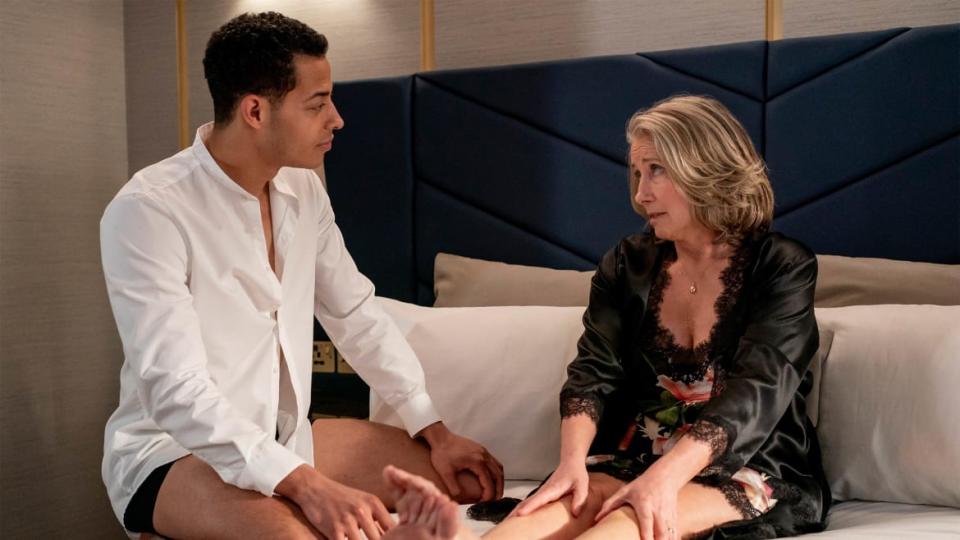Hollywood Intimacy Coordinators Fire Back at Sean Bean: We Make Onscreen Sex Look ‘More Realistic’

Intimacy coordinators, the behind-the-scenes workers who choreograph onscreen sex for TV and film, were suddenly thrust into the limelight this past week.
It all started on Friday, when British actor Sean Bean questioned their raison d’être in an interview with The Times of London. Declaring himself not a fan, the Game of Thrones star worried that they’d “spoil the spontaneity.”
“I think the natural way lovers behave would be ruined by someone bringing it right down to a technical exercise,” said the acting vet, who has not participated in many sex scenes throughout his career. “It would inhibit me more because it’s drawing attention to things.”
The role of the intimacy coordinator is fairly new. The 2017 HBO show The Deuce, about the Golden Age of Porn in New York City, is often cited as the series that opened the floodgates to the nascent industry-within-an-industry. In just a few short years, ICs have built up quite a bit of goodwill in Hollywood and have become increasingly common among productions.
Before they were widely used, it was mostly up to the actors, directors and assistant directors to negotiate which moves were appropriate and which weren’t, says Yehuda Duenyas, an intimacy coordinator who most recently worked on Season 2 of the Apple TV+ comedy The Afterparty and the upcoming Showtime drama American Gigolo.
“There was no real method or practice as to how to choreograph and stage these scenes and establish a level of comfort and consent,” Duenyas told The Daily Beast.
Anne Heche Deserved So Much Better From Hollywood—and Us
One of the few male ICs in the game, he learned how to guide actors through steamy scenes by directing plays in New York City with “really extreme content” in them, citing Thomas Bradshaw’s Purity and Fulfillment as examples.
“It was really important to me that the actors I was working with felt good and didn’t dread coming to work and could give 110 percent of themselves in their performances,” he explained.
The #MeToo movement empowered actors to speak up about the conditions on set, an untraditional workplace where your co-worker may be tasked with humping you for hours as long as it’s in the script. Networks and studios gave in, hiring in-house ICs to block intimate moments.
After Bean’s comments made headlines, several actresses came out in favor of intimacy coordinators.
Rachel Zegler, who won a Golden Globe for her breakout role in last year’s film adaptation of West Side Story, tweeted that she was “extremely grateful for the one we had on WSS— they showed grace to a newcomer like myself + educated those around me who’ve had years of experience.”
Duenyas echoed that same feeling, adding, “Acting is learning lines, rehearsing them, repeating them. All acting is the appearance of being spontaneous.”
Emma Thompson also spoke out against Bean’s comments in an interview with the Australian radio station Nova, calling intimacy coordinators “fantastically important.”
“You might find that people go, ‘It made me feel comfortable, it made me feel safe, it made me feel as though I was able to do this work,’’ the Oscar-winning actress said, adding, “And no, you can't just let it flow. There’s a camera there and a crew. You’re not on your own in a hotel room, you’re surrounded by a bunch of blokes, mostly. So it’s not a comfortable situation full stop.”
Meanwhile, Emmy-nominated actress Amanda Seyfried recalled walking around in her underwear on sets when she was 19 in an interview with Porter magazine published on Monday. “How did I let that happen? Oh, I know why: I was 19 and I didn’t want to upset anybody, and I wanted to keep my job. That’s why,” she said.
Intimacy coordinator Alexandra Tydings understands the pressures befalling young actresses. She played Aphrodite, the goddess of love, on the ’90s TV shows Hercules: The Legendary Journeys and Xena: Warrior Princess. Photos from the time show her walking around the set in lingerie. Having a dedicated person to confide in about what you can touch—and what you don’t want others to touch—can be a godsend for actors who are skittish in an already tense environment and don’t want to upset their higher-ups, she says.
“By having conversations ahead of time, by allowing each of the actors to talk about what they do and don’t feel comfortable with, a level of trust is created,” she told The Daily Beast. “It sounds like Sean Bean thinks having an IC means actors aren’t allowed to improvise, and that simply isn’t true. Having an IC means actors can improvise more freely, knowing that their boundaries are respected and they aren’t going to inadvertently hurt their partner.”

Daryl McCormack and Emma Thompson in Good Luck to You, Leo Grande
Neither Duenyas nor Tydings said they had experienced significant pushback while doing their jobs. Any weariness about yet another voice on set telling people what to do is offset by the end result, they say.
“I’ve had instances where other crew members aren’t really sure what this job is and don’t take it seriously,” Duenyas said. “And afterwards, I get a lot of, ‘I can’t believe we didn’t have you before, how has it been that only until a few years ago this job didn’t exist?’”
Sex scenes are obviously incredibly physical, but depending on the nature of the sex portrayed, they can also be violent. During the course of our conversations, Duenyas and Tydings compared their jobs to those of stunt coordinators. Few people ever question the need for a crew member to teach an actor how to fake a slap without actually hurting their co-star, their thinking goes, so why is this skepticism leveled at ICs?
“These scenes are a lot like fight scenes,” Tydings said, prompting us to wonder about the thin line between love and hate. “The actors are faking something and trying to make it look real, and that can get tricky technically. I will watch the monitor to make sure the modesty garments aren’t seen on screen and the angle of the bodies looks right, so the actors don’t have to do as many takes. The feedback I get most from people who were hesitant at first is, ‘The scene looked so much more realistic because you were there.’”
Get the Daily Beast's biggest scoops and scandals delivered right to your inbox. Sign up now.
Stay informed and gain unlimited access to the Daily Beast's unmatched reporting. Subscribe now.

 Yahoo Movies
Yahoo Movies 
